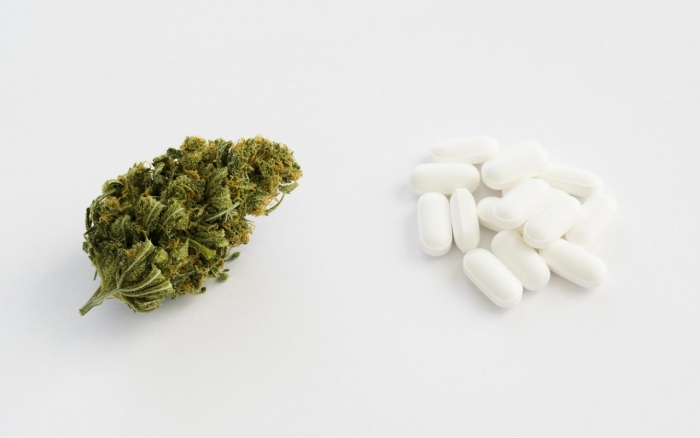How Does Cannabis Interact With Other Drugs?

Virtually all chemical compounds, from over-the-counter drugs and prescription pharmaceuticals to illicit substances, interact with other compounds. There are, for example, 82 identified drug interactions with caffeine (of which 25 are classified as moderately severe to severe). Even seemingly benign substances, like grapefruit, are known to interact with many prescription drugs. When it comes to cannabis, most potential interactions that have been identified are relatively mild. And, in fact, some drugs seem to work together with cannabis favorably.Does Cannabis Interact with Antidepressants?
But, before we dive deep on some of the most common drugs people combine with cannabis, it’s important to understand the difference between an “additive” and “synergistic” effect. Additive simply means the interaction between two chemicals equals the sum of their parts (e.g. 1+1 = 2). Synergistic means that when two chemicals interact, the effect is greater than the sum of their parts (e.g. 1+1 = 3. Sounds like “alternative math!”). Likewise, keep in mind that THC/CBD ratios and different strain profiles (with variable cannabinoid and terpene profiles) can influence effects.
Note: in some cases, cannabis may actually increase the effectiveness or potency of other drugs. But, even if the interaction is potentially beneficial, close monitoring by a medical professional, along with regular blood work, is important as a patient may need adjust their dosing accordingly.
Drugs That Affect Blood Sugar Levels

Interestingly, there is evidence to suggest cannabis may decrease insulin resistance, improve the metabolic process, and improve blood sugar control. However, most evidence comes from large epidemiological studies that analyze general patterns, including the causes and effects of various health conditions within specific populations. (Several studies found that cannabis users had lower rates of obesity and diabetes when compared to non-users.) However, far fewer studies look specifically at how THC, CBD, or other cannabinoids interact with other drugs that have known effects on blood sugar (like insulin).
Although we don’t have conclusive evidence, it’s possible cannabis may work together with other drugs favorably. But, by the same token, there could be a risk that cannabis combined with other drugs could lower glucose levels too much. Clearly, patients should continually monitor the effects (under medical supervision) to mitigate potential risks and adjust medication appropriately.
Drugs That Lower Blood Pressure

One of the major features of THC is that it simultaneously activates the CB1 and CB2 cannabinoid receptors. Activating both receptors induces a cardiovascular stress response that can elevate cardiac oxygen consumption while reducing blood flow in coronary arteries. While reports of adverse events are relatively rare, patients who are taking blood pressure medication should be aware that cannabis may compound effects.Cannabis and Its Impact on High Blood Pressure
Drugs That Increase Risk of Bleeding

Both THC and CBD may increase the effect of drugs used for blood thinning (e.g. warfarin or heparin), or drugs known to carry their own risk of blood thinning (e.g. ibuprofen, naproxen, etc.). How? By possibly slowing down the metabolism of these drugs. To a lesser extent, THC may displace warfarin from protein binding sites.
Opioids

Most studies suggest there is a bidirectional modulatory relationship between the body’s natural opioid system and the body’s natural cannabinoid system (the endocannabinoid system). However, characterizing the specific mechanisms by which they interact proves challenging. Nonetheless, the pain-relieving properties of cannabis are well-established. And, many medical professionals have come forward to suggest cannabis (as an alternative pain medication) could play a role in stemming the overuse of prescription (and illicit) opioids.How Cannabis Could Turn the Opioid Epidemic Around
There’s no question. From an abuse potential and toxicity perspective, cannabis as a substitute to narcotic pain medications would be a far better first-line drug for management of chronic pain.
However, what about as an adjunct to opioid therapy? How does cannabis measure up? Could cannabis reduce a patient’s reliance on opioids, or would combining the two elevate risk of concurrent dependency or abuse?
Examining the subjective effects of vaporized cannabis in conjunction with opioids, Dr. Donald Abrams, an oncologist from UC, San Francisco, and his team published a small study in 2011. They found no significant change in opioid blood level concentrations after exposure to cannabis. Moreover, patients reported a 27% decrease in pain following cannabis administration.
Abrams concluded that cannabis can, in fact, safely augment the pain-relieving effects of opioids. His team also found that combining opioids and cannabis may allow for treating patients with lower opioid doses while reducing risk of dependency and fewer side effects. Several other studies, which we’ll explore further in an upcoming series, support the findings from Abrams’ study.
Alcohol

Mixing alcohol with virtually any drug is generally not a good idea. In fact, mixing it with some drugs (particularly opioids and central nervous system depressants like benzodiazepines, barbiturates, and sleep meds) can prove fatal. But, what about alcohol and cannabis? There’s no doubt: cannabis and alcohol is a popular combination. But what does the research say? Is mixing these two substances okay?
Overall, drawing a conclusion based on available research is subject to interpretation and personal biases. The same studies can be interpreted positively or negatively, depending on your perspective. On the one hand, studies have provided compelling evidence that alcohol increases blood THC levels (although no evidence suggests the converse–that THC increases blood alcohol levels). On the other hand, some research suggests people consume less alcohol when they use cannabis.
420 Intel is Your Source for Marijuana News
420 Intel Canada is your leading news source for the Canadian cannabis industry. Get the latest updates on Canadian cannabis stocks and developments on how Canada continues to be a major player in the worldwide recreational and medical cannabis industry.
420 Intel Canada is the Canadian Industry news outlet that will keep you updated on how these Canadian developments in recreational and medical marijuana will impact the country and the world. Our commitment is to bring you the most important cannabis news stories from across Canada every day of the week.
Marijuana industry news is a constant endeavor with new developments each day. For marijuana news across the True North, 420 Intel Canada promises to bring you quality, Canadian, cannabis industry news.
You can get 420 Intel news delivered directly to your inbox by signing up for our daily marijuana news, ensuring you’re always kept up to date on the ever-changing cannabis industry. To stay even better informed about marijuana legalization news follow us on Twitter, Facebook and LinkedIn.




